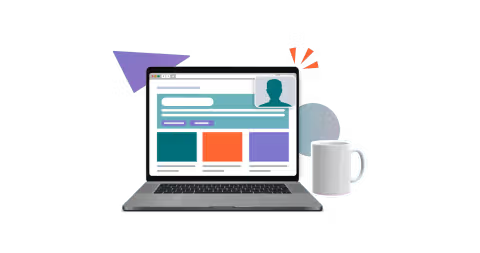What is a digital nomad, and how do you become one?
Share on socials
What is a digital nomad, and how do you become one?

Jump to Section
Jump to section
What is a digital nomad?
How to become a digital nomad: five simple steps
The pros and cons of being a digital nomad
The best jobs for digital nomads
Work wherever you want to! Our guide gives you the steps to get started as a digital nomad, plus some pros and cons for you to consider.
Employees of digital businesses no longer have to be confined to their employers’ offices or even the same country! This new set-up is creating a generation of 'digital nomads' who can live and work wherever they please - you just need a digital nomad visa. Sounds ideal, doesn't it?
In this blog, we explore what digital nomads are and how to become one while looking at some of the pros and cons of this working situation.
In this blog, we explore what digital nomads are and how to become one while looking at some of the pros and cons of this working situation.
What is a digital nomad?
A digital nomad uses only digital technology and internet connectivity to work remotely, either as an employee or freelancer. These people can combine work and travel while living and exploring various locations worldwide.
The term 'digital nomad' comes from a take on the traditional meaning of nomad: someone who’s permanently on the move with no fixed base. A digital nomad still shares this lifestyle but leverages the benefits of digital technology to work while funding their lifestyle.
The term 'digital nomad' comes from a take on the traditional meaning of nomad: someone who’s permanently on the move with no fixed base. A digital nomad still shares this lifestyle but leverages the benefits of digital technology to work while funding their lifestyle.
How to become a digital nomad: five simple steps
If you think the life of a digital nomad sounds very much up your street, we’ve broken down everything you need to know about how to become a digital nomad in five simple steps:
1. Assess your current profession and skill set
Firstly, you’ll need to be in a profession that doesn't require a physical presence at a specific location and work for an organisation open to remote working (or work for yourself). Without this, your dream of becoming a digital nomad looks rather non-existent.
Once you know that working remotely is possible, you should assess your skill set. To work remotely, you need to know how to use technology to keep in touch with your employer and/or clients. If you don’t have these skills, don’t worry; you can train yourself and get up to speed.
Once you know that working remotely is possible, you should assess your skill set. To work remotely, you need to know how to use technology to keep in touch with your employer and/or clients. If you don’t have these skills, don’t worry; you can train yourself and get up to speed.
2. Financially plan for your life as a digital nomad
Consider how much things like accommodation, food, transportation, etc., will cost when travelling to your chosen destinations. For example, the average rent in New York is $4,495/month (roughly £3,350), but in Mexico, monthly expenses might only set you back £1,200.
Costs will fluctuate depending on where you are in the world, so it would be wise to save money so you don’t find yourself stranded in a remote part of the globe.
Costs will fluctuate depending on where you are in the world, so it would be wise to save money so you don’t find yourself stranded in a remote part of the globe.
3. Choose a location
You’ll need to consider where you’re travelling to as a digital nomad, including the cost of living, digital connectivity, culture, and visa requirements. You don't want to fall foul of unaffordable rent or poor internet connection just because you haven’t researched your destination properly.
Note: Not all countries will allow you to work freely as a digital nomad. While some countries provide special digital nomad visas to help you live and work there, some don’t. So it really pays to do your research in this area.
Psst. Don’t know where to go? Here are the best digital nomad destinations to consider.
Note: Not all countries will allow you to work freely as a digital nomad. While some countries provide special digital nomad visas to help you live and work there, some don’t. So it really pays to do your research in this area.
Psst. Don’t know where to go? Here are the best digital nomad destinations to consider.
4. Join a community
You can find social and work-related support by joining online communities and forums specifically for digital nomads. These communities can help you identify co-working facilities and social events taking place in your area.
If you're working as a freelance digital nomad, being involved in these communities, as well as having a presence on social media networks, such as LinkedIn, can help you identify additional job opportunities.
If you’re part of a remote working team, just because you’re thousands of miles from the office, it doesn’t mean you can’t facilitate effective remote team communication. There are plenty of tools out there that create centralised communication when you need it most.
If you're working as a freelance digital nomad, being involved in these communities, as well as having a presence on social media networks, such as LinkedIn, can help you identify additional job opportunities.
If you’re part of a remote working team, just because you’re thousands of miles from the office, it doesn’t mean you can’t facilitate effective remote team communication. There are plenty of tools out there that create centralised communication when you need it most.
5. Prepare yourself for the realities
Being a digital worker isn't all sitting on a beach and sipping piña coladas. Prepare for things that could go wrong, such as if you have medical issues. Thoroughly equip yourself with knowledge of local healthcare, read up on cultural norms, and help yourself overcome any language barriers.
The pros and cons of being a digital nomad
Pros:
- A better work-life balance. Living and working in a new environment and immersing yourself in a different culture can inspire you to seek out a better work-life balance.
- New experiences. Instead of commuting home down the M1 or M4, you can explore the local nightlife scene or go swimming in the turquoise waters of Thailand. New experiences help boost personal growth.
- Financial benefits. Living in another country can mean accessing a lower cost of living while still earning the exact same wage you did before.
Cons:
- Burnout is a real thing. Research found 42.9% of freelancers are feeling burnt out from working long days. And it’s easily done. When you’re in charge of your own schedule (particularly as a freelancer), it’s easy to respond to emails at 10pm or work over weekends to meet deadlines.
- Maintaining productivity can be challenging. Working remotely can mean a decline in productivity. The beach might be calling your name, but you still have to work to earn money!
- Potential loneliness. Working by yourself can be hard, even in your own country. But when you’re travelling without any support system, it can become lonely fast. Consider this before taking the plunge.
The best jobs for digital nomads
There are so many jobs that lend themselves to the digital nomad lifestyle. Basically, any job that only requires a laptop and wi-fi and you’re good to go. Think graphic designer, web developer, content writer, marketing consultant, and virtual assistant - to name a few.
If you’re on the fence but seriously considering becoming a digital nomad, check out our best digital nomad destinations.
If you’re on the fence but seriously considering becoming a digital nomad, check out our best digital nomad destinations.
We create tools to help people work better together
Discover how our Confluence apps can help you with your workload and get your 30-day free trial today.
Related Content
Read moreWritten by

Content Writer
Helen is a freelance content writer specialising in Software as a Service (SaaS). She has a BA Hons degree in English, a Chartered Institute of Marketing qualification, and over ten years of experience in content marketing.
Related Content
Read more


